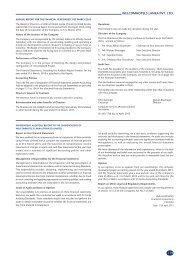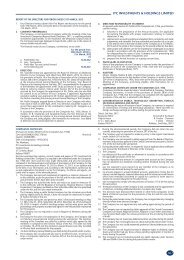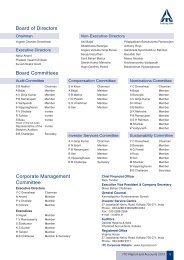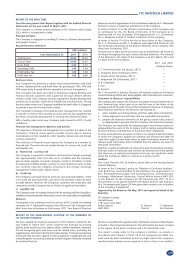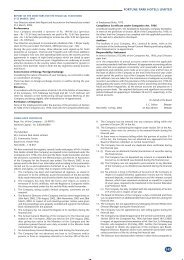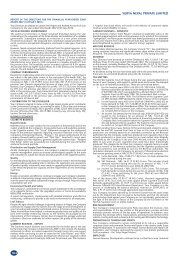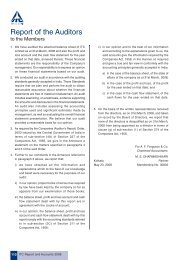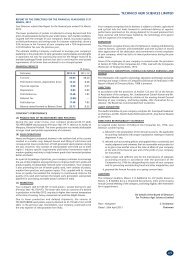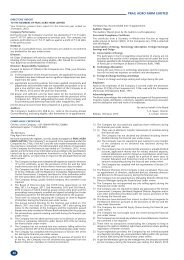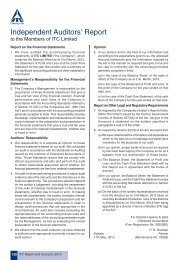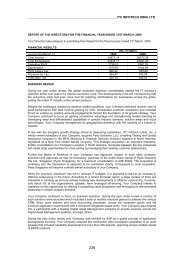SUBSIDIARY COMPANIES - ITC Ltd
SUBSIDIARY COMPANIES - ITC Ltd
SUBSIDIARY COMPANIES - ITC Ltd
You also want an ePaper? Increase the reach of your titles
YUMPU automatically turns print PDFs into web optimized ePapers that Google loves.
REPORT OF THE DIRECTORS FOR THE FINANCIAL YEAR ENDED 32ND<br />
ASADH 2068 (16TH JULY, 2011)<br />
Your Directors are pleased to submit their Report and Audited Accounts of your<br />
Company for the year ended 32nd Asadh 2068 (16th July, 2011).<br />
SOCIO-ECONOMIC ENVIRONMENT<br />
The unsettled political environment in Nepal continued through the year under<br />
review. Intermittent disruptions and industrial unrest were palpable. Workers<br />
at the industrial belts of Biratnagar and Simra including those at the company’s<br />
factories, went on strike in March 2011 demanding, inter alia, a 100% increase<br />
in wages. While the Company’s factories resumed operations after 8 days of<br />
strike, the Company was forced to declare an indefinite lockout from 16th<br />
June, 2011 at its garments manufacturing Unit at Biratnagar after Company<br />
officials were locked inside the factory premises by agitating workers who were<br />
illegally demanding wages for the period when they stayed away from work.<br />
The industry-wide dispute on minimum wages is pending before the Supreme<br />
Court of Nepal for resolution.<br />
In its Economic Survey, the Government of Nepal, has estimated GDP growth<br />
for the financial year ended mid July 2011 at 3.5% against 4% in the previous<br />
year with Industry growing only at 1.4% compared to 3.3 % last year.<br />
During the year, the Tobacco Products (Control and Regulation) Act was<br />
promulgated, which lays down the legal framework for regulation of production,<br />
sale, distribution and consumption of tobacco products. Whilst the legal cigarette<br />
industry accounts for almost 50% of the overall tobacco consumption in Nepal,<br />
the balance 50% is consumed mainly in the form of smuggled cigarettes (6%)<br />
bidi and khaini/other smokeless tobacco products (44%). The legal cigarette<br />
Industry contributes about 91% of the Government’s revenue from tobacco<br />
with a share of about 4.6% of the Government’s total tax revenue. Other forms<br />
of tobacco products, constituting a significant share of tobacco consumption<br />
being lightly taxed/evasion prone contribute only 9% of the government’s<br />
revenue from tobacco, and constitute less than half percent of the Government’s<br />
total tax revenue.<br />
A recent report on Tobacco Control in Nepal published by Ministry of Health<br />
and Population inter alia has highlighted the low taxation on bidis and lack of<br />
uniform taxation on all forms of tobacco products as some of the weaknesses<br />
in the Government’s tobacco industry related policies. The twin impacts of<br />
discriminatory taxation and regulatory policy framework against the legal<br />
cigarette industry has led to steady and continuous erosion of legal cigarette’s<br />
share in the overall tobacco basket, leading to several unintended and adverse<br />
consequences like increase in smuggling of cigarettes and other tobacco<br />
products and increase in consumption of lightly taxed/tax evaded tobacco<br />
products etc. The World Health Organisation (WHO) in its Technical Manual<br />
on Tobacco Administration recognising such impact has highlighted the<br />
importance of increasing taxes and prices for all tobacco products.<br />
The Tobacco control legislation which took effect from 7th August 2011<br />
incorporated certain provisions that place the legal cigarette industry at a<br />
disadvantage and are out of step with those followed in neighbouring countries.<br />
These are likely to encourage smuggling of cigarettes, evasion of taxes, as well<br />
as fuel further growth in consumption of other forms of tobacco over cigarettes.<br />
The disproportionate size of warning on cigarette packs, proposed to be<br />
implemented from November 2011, may lead to increased smuggling of<br />
cigarette packs with less stringent/no health warnings. Further, the absence of<br />
standards on declaration of nicotine and absence of definition and standards<br />
on declaration of “other harmful ingredients” for all tobacco products would<br />
encourage sale of tobacco products with inadequate/no declarations such as<br />
smuggled cigarettes and non-cigarette tobacco products like bidis, chewing<br />
tobacco, khaini etc. by creating the perception in the minds of consumers that<br />
these products are “safer”. The non-cigarette tobacco products are manufactured<br />
mainly in the unorganised sectors and are therefore also prone to tax evasion.<br />
Therefore, such discriminatory tobacco control policies, as enunciated above,<br />
lead to a skewed pattern of Tobacco consumption thereby not supporting the<br />
objectives of Tobacco control and sub-optimising tax revenue collections of<br />
the Government. As a responsible member of the industry, your Company is<br />
committed to a pragmatic and purposeful policy for the country’s tobacco<br />
industry and continues to represent to the Government for reconsideration of<br />
186<br />
Legal Cigarettes 50%<br />
Smuggled cigarettes 6%<br />
Other Tobacco Products 44%<br />
From legal cigarettes 91%<br />
From other tobacco products 9%<br />
CONSUMPTION SHARE TAX REVENUE SHARE<br />
Source: WHO Survey & Industry Estimates Source: Industry Estimates<br />
SURYA NEPAL PRIVATE LIMITED<br />
certain provisions of the Tobacco Control legislation that may not be consistent<br />
with the approach of creating a pragmatic and purposeful policy framework.<br />
COMPANY PERFORMANCE<br />
Amidst the challenging operating environment, the company maintained its<br />
growth trajectory during the year under review. For the year ended 32nd Asadh<br />
2068 (July 16, 2011), the company recorded a 19% growth in sales with Gross<br />
Turnover (net of VAT) increasing to NRs. 1,328 ( ` 830) Crores from NRs.1,116<br />
(` 697.5) Crores in the previous year. The Profits after Tax at NRs. 254<br />
(` 158.8) Crores increased by 29% and return on net worth increased to 110%<br />
from 90% in the previous year. Cash generated from operations at NRs 198<br />
(` 123.8) Crores was however lower by NRs. 43 (` 26.9) Crores as compared<br />
to previous year due to higher Trade Advances and increased Inventory.<br />
CONTRIBUTION TO THE EXCHEQUER<br />
Your Company retained its status as the single largest private sector contributor<br />
to the Government Exchequer, accounting for about 3.5% of the total revenues<br />
of the Government of Nepal. Your Company paid NRs. 710 (` 443.7) Crores<br />
by way of Excise Duty, VAT, Income Tax and other taxes during the year {Previous<br />
Year: NRs. 622 (Rs. 389) Crores}.<br />
Your Company’s Excise Duty contribution to the exchequer constitutes nearly<br />
16% of Government’s total Excise revenue while the VAT and Income Tax<br />
contribution constitutes nearly 3% of Government’s total VAT & Income Tax<br />
revenue. The corporate income tax policy of the Government for multi business<br />
corporations like your Company, provides limited scope for setting of losses<br />
arising out of other businesses with profits of the cigarette business. This acts<br />
as a disincentive to the business diversification plans of your Company. Your<br />
Company continues to represent to the government to widen the scope of<br />
business loss set off to create an investment friendly environment which will<br />
also support your Company’s business diversification.<br />
EMPLOYMENT GENERATION<br />
Your Company, through its multiple businesses, continues to provide<br />
directly/indirectly livelihood to est. 130000 people in the country which includes<br />
12000 farmers and est. 30000 farm labourers. As a responsible corporate citizen<br />
of the country, your Company will continue to create enablers for generating<br />
employment and economic surpluses for the nation.<br />
BUSINESS SEGMENTS<br />
CIGARETTE BUSINESS<br />
Brand Portfolio<br />
The Company continues to invest in providing consumers a wide range of<br />
choices at laddered price points and in upgrading product quality.<br />
Keeping in mind the wide income dispersion of Nepal, operating at several<br />
price points is imperative to satisfy consumer needs for the modern form of<br />
tobacco consumption and also to counter the menace of illegal smuggling,<br />
both at the premium end of the market as well as the lower end of the price<br />
table.<br />
The current specific duty structure is optimal for meeting the objectives of<br />
fulfilling consumer needs at different price points, quality upgradation and<br />
revenue collection for the Government in a transparent and litigation free<br />
manner.<br />
Distribution and Supply Chain Management<br />
Amidst challenging circumstances, the company’s proactive supply chain and<br />
inventory management system ensured uninterrupted supplies to the trade<br />
and consumers.<br />
Manufacturing, Quality and Projects<br />
On the manufacturing front, your company continued to invest in new<br />
technology cigarette making and packing lines, additional infrastructure, and<br />
development of human talent to reinforce superior and consistent product<br />
quality and to augment capacity. The construction of a second cigarette factory<br />
near Pokhara has commenced and will position the company well for servicing<br />
consumer demand for its products over the longer term.<br />
Your Company has entered into Project Coordination Agreements for the<br />
Pokhara Cigarette Factory Project and Kathmandu Housing, Corporate Office<br />
and Warehousing Project with the Central Projects office of the Holding<br />
Company, <strong>ITC</strong> Limited (<strong>ITC</strong>), India, to leverage <strong>ITC</strong>’s vast experience and<br />
expertise in setting up Cigarette factories and world class energy saving Green<br />
Buildings. The approval from the Department of Industries, Nepal has also been<br />
received for implementation of above Project Co-ordination agreements.<br />
Energy<br />
Energy conservation and efficiency continue to engage your Company’s attention<br />
as areas of critical priority. Accordingly, several energy saving initiatives were<br />
implemented during the year to reduce the energy consumption per unit.<br />
Environment Health and Safety<br />
Institutionalising systems relating to Environment, Health and Safety has enabled<br />
benchmarked work environment for all employees.



